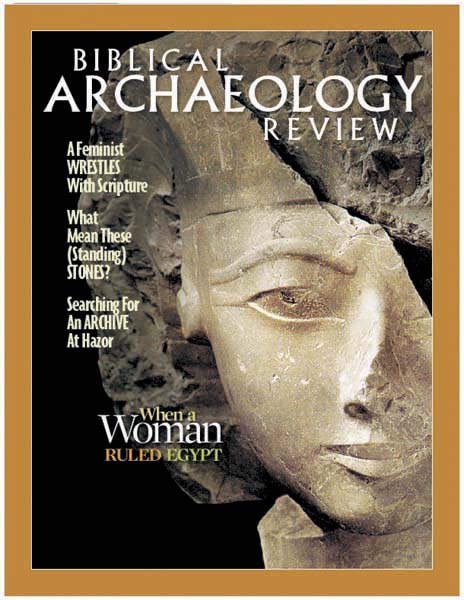Biblical Archaeology Review, March/April 2006

Features
An archive of clay tablets written in cuneiform signs has never been found in what was to be the Land of Israel, although at numerous other sites in the ancient Near East archives holding hundreds and sometimes even thousands of tablets have been discovered. The illustrious Israeli archaeologist Yigael Yadin, who excavated Hazor for […]
038 Standing stones are still a puzzle. They’re hard to understand. Standing stones have been found in the Near East from as early as 10,000 B.C.E.,a and they continue through the Biblical period. Massebah (plural masseboth) is the Hebrew word usually translated “standing stone(s).” Massebah and its variants appear 34 times in the […]
Phyllis Trible is surely one of the most distinguished feminist Biblical scholars in the world. In 1994, she served as president of the Society of Biblical Literature, only the second woman to serve in that capacity since the organization was founded in 1880. (And only two other women have subsequently received this annual honor.) […]
The Onomasticon by Eusebius of Caesarea, Palestine in the Fourth Century A.D. Translated by G.S.P. Freeman-Grenville, indexed by Rupert L. Chapman III, edited and introduced by Joan E. Taylor (Jerusalem: Carta, 2003), 206 pp. + 8 maps. $44.95 She had traveled to ancient Palestine to tour the holy places, and now, after three […]
The Second Jewish Revolt against Rome, also known as the Bar Kokhba Revolt after its almost legendary leader, lasted from 132 to 135 C.E. Like the First Jewish Revolt of 66–70 C.E., it was brutally crushed. But, unlike the First Revolt (in which the Temple was destroyed), there was no Josephus to record […]
Two centuries before the traditional date of the Exodus, a female pharaoh ruled Egypt. Very few women in the ancient world wielded any real political power. The greatest of these in ancient Egypt was Hatshepsut, who ruled for more than two decades (c. 1479–1458 B.C.) during the early part of the New Kingdom (c. […]
